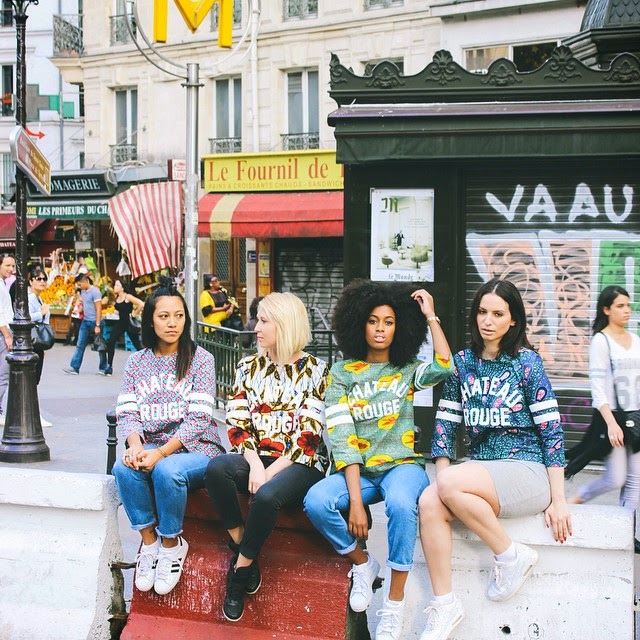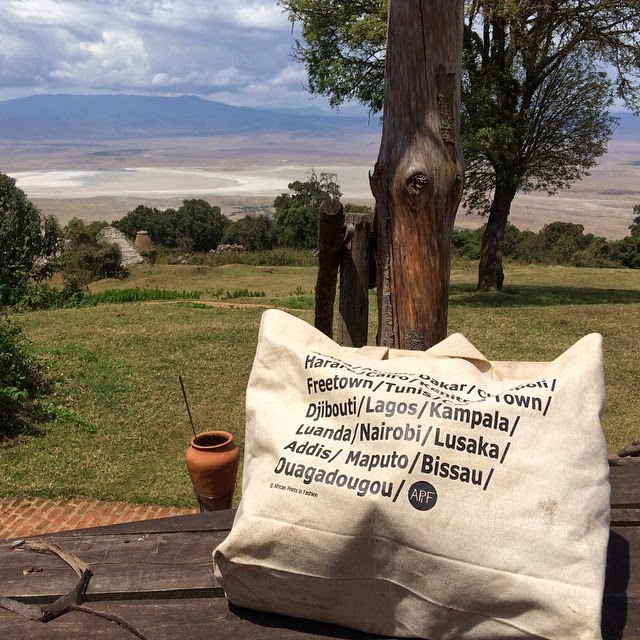
This article was originally published on Chayet Chiénin’s blog, Nothing but the wax. Maison Château Rouge — does that name ring a bell? It might not just yet, but it’s the brand new Parisian label that has just come onto the fashion scene, subtly mixing the urban and streetwear worlds with the world of African print. Their sweatshirts and t-shirts are already creating a buzz on social media. Be proud of where you’re from, your heritage and roots, because that’s exactly what it’s all about. These notions of belonging to a place and a community are values that have become more and more popular among fashion labels, and they’re having a …
This article was originally published on Chayet Chiénin’s blog, Nothing but the wax.
Maison Château Rouge — does that name ring a bell? It might not just yet, but it’s the brand new Parisian label that has just come onto the fashion scene, subtly mixing the urban and streetwear worlds with the world of African print. Their sweatshirts and t-shirts are already creating a buzz on social media. Be proud of where you’re from, your heritage and roots, because that’s exactly what it’s all about. These notions of belonging to a place and a community are values that have become more and more popular among fashion labels, and they’re having a field day with the idea of belonging.

In Paris, you could name, for example, the famous label Africa is the Future; the magazine Fashizblack, which has launched a series of “Made in” t-shirts celebrating different cities of origin and the designer Sakina M’sa.
In New York, Kukua, from the blog “African Prints in Fashion,” charms with her “African cities” bags decorated with the names of cities throughout the continent, as does the brand Caven Etomi with its African heritage tees.
In London, the label Mr Garbe also celebrates African cities and countries with Afri Tribe, which ccelebrates the notion of tribal affiliation.


Maison Château Rouge therefore isn’t the first to enter this market — especially not in the niche markets of Afro-urban and Afropolitan (Afro-cosmopolitan) fashion.
But it must be said that a trend can only stand the test of time if it responds to the genuine, fundamental needs of consumers. It wouldn’t be an exaggeration to say that Africans belonging to today’s Diaspora, and especially those of my generation (I turned 29 a month ago), are undergoing a real return to the roots, born not of a label’s well-orchestrated marketing campaign, but of an absence — and subsequent need for validation — of their cultural heritage. A need to know and learn more about it, and more importantly, to assert its validity and importance.
Today, we see the boom of the natural hair movement (a celebration of kinky hair), of African fashion (through the explosion of African Fashion Week and of the Afropolitan marketplace), an opening up of African art and aestheticism (through artists like Mary Sibande, Toyin Odutola and Yinka Shonibare) and the emergence of new role models (Richard Turere, Lupita Nyongo, Chimamanda Ngozie Adichie). Over the past few years, there has been a rebirth in films that tell stories about racial segregation (like Twelve Years a Slave, Django Unchained and The Help ). These are only a few examples among many others, but they serve to convey the idea of a much grander, more complex and more multiform growing generational phenomenon.
Indeed, if you are reading this today it is very much thanks to the diaspora of this generation, which is educated, open to the world and proud of its dual culture. It is thanks to this generation, which hasn’t waited for outside interest, but rather has created its own businesses, brands, media and blogs to validate what has not been validated up until now. A connected and engaged generation that dares to denounce acts of racism or even ordinary stigmatization by putting up a united front against all of it (taking on, for instance, the use of blackface and the absence of black mannequins in fashion – to name just two narrow issues). A conscious and responsible generation that wants to contribute, in its own way, to a renewal in how the world sees Africa.
It is very much thanks to this generational phenomenon, combined with a number of other factors, that we are now witnessing a kind of revolution and a return to roots from young Africans of the Diaspora.
At school, I was often spoken to about the famous “generation Y” of which I was to be a part — it’s either a social sciences term or a marketing term, take your pick. This generation Y would be made up of people born between 1977 and 1997, which, unlike their parents and grandparents; we would be brazen, impatient, would favor personal over professional growth and demonstrate selflessness. I was told we’d become cautious and informed consumers.
I think that it might be interesting, from a sociological point of view, to establish from the very heart of the generation Y concept a supplemental stratum: generation A, the Afropolitan generation. Because this part of the population has its own history, tied to immigration and its African roots, which explains its behavior today.
So there you have it–one of the reasons that, in my opinion, this trend of t-shirts displaying the theme of belonging is gaining public support. It speaks to the very heart of this generation. This fashion trend can only become stronger, because success is born of opportunism and feeds on marketing ideas and actions which aim to make the trend last.
That being said, on a lighter note, I confess that I have personally given in to the “Barbès mon amour” t-shirt and the “African cities bag” from African Prints in Fashion. This bag has followed me throughout my journey in Tanzania, from the Ngorongoro crater (that you can see in the photo below) to the beaches of Zanzibar.

This post was originally published on HuffPost France and was translated into English.
Taken from:
African Fashion Is Taking A Generation By Storm And Validating Its Importance





















